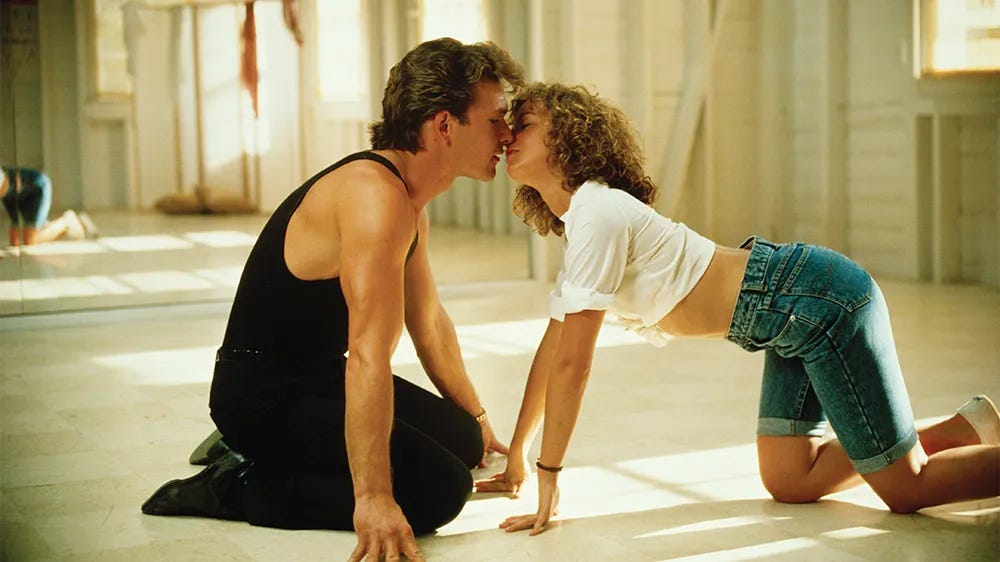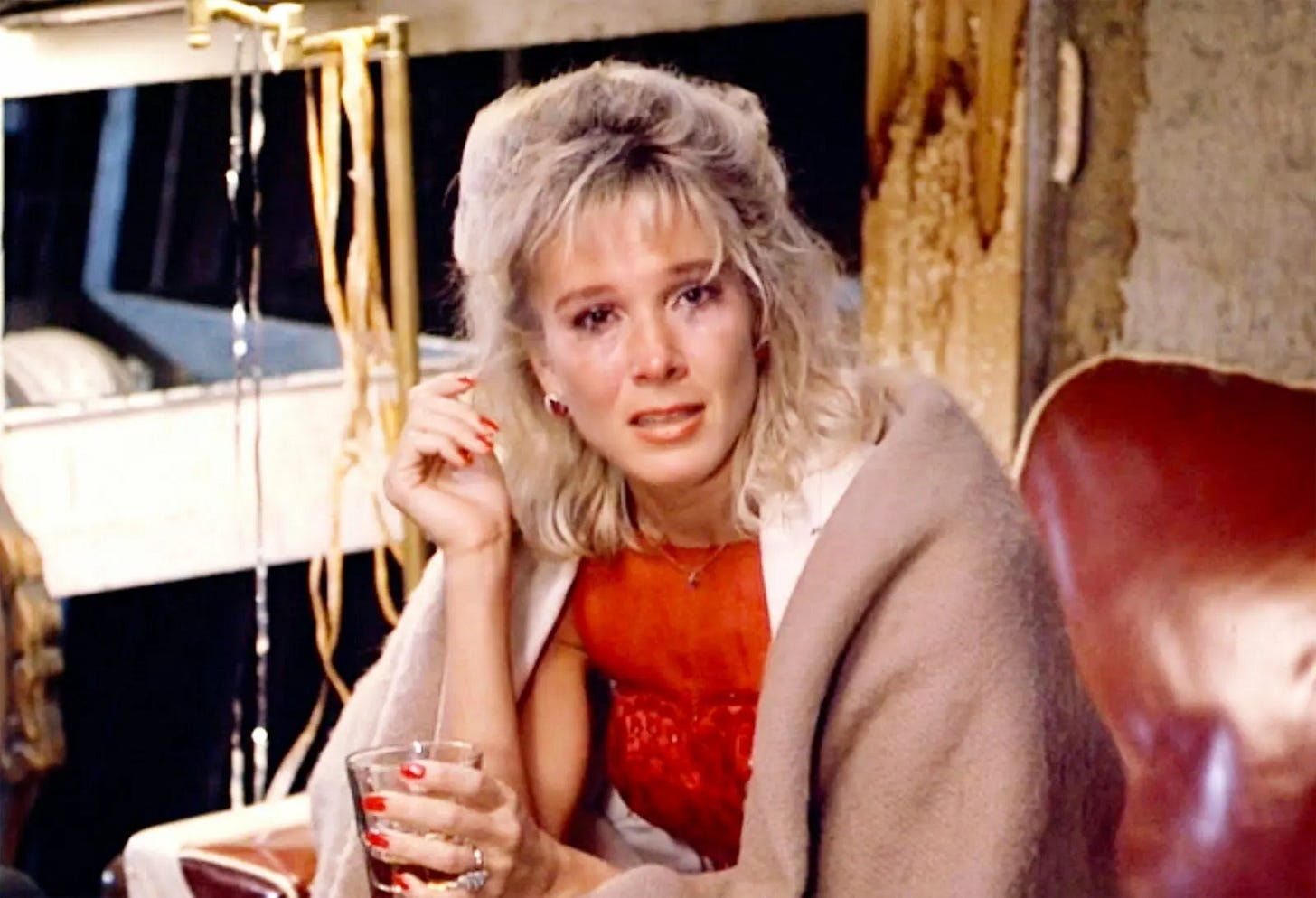Dirty Dancing
That was the summer of 1963 when everyone called me baby and it didn’t occur to me to mind.
In August 2022–only a few months after Roe V Wade was overturned–I went to see Dirty Dancing for the first time in theaters in honor of its 35th anniversary. Dirty Dancing turns 37 on Wednesday, which is why I wanted to cover its captivating romance, sensual dancing, and undeniable politics for this week’s newsletter. I always found it funny that Dirty Dancing is one of the most iconic movies of the 80s but is set two decades earlier, in 1963.
Still, it resonated with audiences and continues to resonate over three decades later. I love a good romance like anyone else, but what has always set Dirty Dancing apart for me is its dedication to taboo topics at a time when it was rare for things like abortion to be handled so responsibly in film. The movie has withstood the test of time, and in my opinion, this is linked to how brave it was. Dirty Dancing is truly a romance film with integrity, which is why I was so excited to analyze it for Movie Mondays.
Finding Liberation Through Love
The love story between Frances “Baby” Houseman and Johnny Castle is the centerpiece of the film, but it’s more than the average enemies-to-lovers trope. I’m always looking for reasons to bring up Titanic, but for me, the dynamic is similar. Rose felt trapped by her mother and her lifestyle, and falling in love with Jack was a way for her to break free and find liberation. In Dirty Dancing, Baby has a complicated relationship with her father, Jake. She’s a daddy’s girl, and he sees her as incapable of doing anything wrong. While this makes her incredibly trustworthy, which comes in handy later on, it also imprisons her.
Through Johnny, Baby becomes liberated. It’s not that Baby needed Johnny in order to free herself; of course, she could have done that on her own. But by meeting Johnny, she was able to see all the ways in which her father had been wrong. She realized life isn’t about marrying an Ivy League graduate with a high-paying career or trying to please her parents. She may have been very naive at the beginning of the film, believing she could do good for the world but not truly knowing what that meant, but Johnny opened her eyes to areas of life from which she was sheltered. Because she loved him, she found compassion for a group of people she otherwise would have never interacted with.
“I’m scared of everything. I’m scared of what I saw. I’m scared of what I did, of who I am, and most of all, I’m scared of walking out of this room and never feeling the rest of my whole life the way I feel when I’m with you,”-Baby, Dirty Dancing.
Baby’s rebellious affair with Johnny feels different than a typical good girl-bad boy love story because, to me, Johnny was never a “bad boy.” He came across as rude and downright disrespectful on several occasions, but his behavior was justified by his frustration with being disrespected by a bunch of wealthy guests at Kellerman’s Resort. Understandably, he assumes Baby is just as entitled as everyone else. But he doesn’t necessarily have a bad boy front that Baby has to break through. I think he opens up pretty quickly once he sees Baby has a good heart.
The storyline is way more unique than others, and it gives context to Johnny’s behavior. By being with Johnny and spending time with his friends, Baby is able to gain the strength to stand up for her father and call him out for his hypocritical and judgmental beliefs. I respect that Baby is able to do this and that the film allows this to be something that strengthens the relationship between Baby and her father. She’s truly able to have her cake and eat it, too, because she gets to be with Johnny in the end, and she has her father’s blessing because he realizes that he was wrong. Even though Baby disobeyed him, he’s proud of her for standing up for what she believes in and, as a result, coming into her own.
Plus, I admire the way Johnny treats Baby, in one scene praising her for her bravery and, of course, in the most iconic scene of the film, when Johnny exclaims, “Nobody puts Baby in a corner,” he’s reminding everyone that Baby is special and she deserves to be seen. She shouldn’t be hidden away literally and figuratively. Baby should not have to hide her truth from her father to appease him, but she should be seen and heard for who she truly is.
Dancing
As the title tells us, there would be no Dirty Dancing without the dancing element of the film. There are many benefits to moving your body, one of them being building a relationship with yourself and becoming comfortable in your own skin. When I wrote reality TV stories, I interviewed Val Chmerkovskiy from Dancing With The Stars, and we had a beautiful conversation about dance. I also once met a woman who taught dance to male prisoners to help them get in touch with their femininity, which would prevent them from turning to violence once they were released back into the world.
When Baby meets Johnny at the secret staff dance party and dances with him for the first time, we see in real-time how she loosens up from the more uptight, traditional girl her parents raised her to be to a liberated version of herself as her body moves freely to the music. Initially, Baby is seemingly experiencing culture shock as the way the staff workers are dancing is far from what she’s seen in her life. But this is the moment Baby begins to question everything she’s known.
“Nobody puts baby in a corner,”-Johnny, Dirty Dancing.
For me, my favorite dance scene isn’t the ending routine to “(I’ve Had) The Time Of My Life” featuring the iconic lift–choreographed by Kenny Ortega!! It’s actually a few scenes like the “Hungry Eyes” rehearsal sequence, when Baby and Johnny practice the lift in the lake, and the “Love Is Strange” scene. From a 2024 lens, this scene feels like something that would go viral on TikTok, but I always loved the way they strayed from rehearsals to mouth the lyrics to each other and fool around in the rehearsal room. Plus, anytime I hear the word “loverboy,” I can’t help but think of Patrick Swayze.
The Politics Of Dirty Dancing
I've read a few analyses online that consider Dirty Dancing to be a deeply feminist film, and based on its topics of female liberation and its pro-choice stance, I have to agree. The film also heavily focuses on the division of social classes. Race was excluded from the film, as it unfortunately was in the 80s, but class was a major plotline. The wait staff at the resort consists of Ivy League students who effortlessly gain the respect of their boss, Max, as well as the many wealthy guests, including Jake. In one scene, we actually see Max demeaning the dance staff, including Johnny, which is one of the first moments Baby becomes aware of her own privilege.
Before falling in love with Johnny, Baby spends quite some time with Max's grandson Neil, to her parents' approval. Neil is a pretty unbearable character, and it doesn't take long for Baby to learn how condescending he is. However, because he fits in with the upper class, her parents would rather see her running around the resort with him and not Johnny. When Baby finds out about Penny's pregnancy, she assumes Johnny is the father. Later, Jake makes the same assumption. In reality, Robbie is responsible but no one would suspect this since he's a seemingly intelligent and responsible man. As we know in society, it is completely ignorant to assume that someone who comes from a wealthy or educated background doesn't make mistakes, and having Robbie intertwined with such a controversial storyline was an incredibly powerful decision.
Penny's situation also leads to some bold actions on Baby's part as she asks her father for money for the abortion, knowing he'll give it to her without an explanation because he trusts her. This later blows up in her face when Penny's put in danger by an irresponsible and unqualified doctor. However, Baby risks her image with her father to get him to help Penny. Despite being angry at his daughter for lying and disapproving of her relationship with Johnny, he helps Penny. Dirty Dancing did a great job handling the storyline, as at no point did any of the characters inflict shame upon Penny. Even in a scene where Penny feels ashamed and afraid, explaining to Baby that she doesn't sleep around and only slept with Robbie because she believed he loved her, none of the characters shame Penny for the unexpected pregnancy or her choice to terminate it.
Baby is understanding and compassionate toward Penny and comforts her when she confesses to being nervous about the procedure. Jake, though very judgmental throughout the film, also does not shame Penny. We don't know his morals, but we know he is committed to saving Penny's life, and that's his most redeemable quality in the film. In fact, in the end, once Jake accepts Baby and Johnny, the only person he does seem to shame is Robbie. The whole time, he thought Johnny was the irresponsible one who impregnated Penny and then left her to deal with the issue on her own. When he finds out it is Robbie, he takes back the money he had given him for medical school and apologizes to Johnny.
“You told me everyone was alike and deserved a fair break, but you meant everybody who was like you,”-Baby, Dirty Dancing.
The lack of diversity in the film is unfortunate, but I still believe the focus on class and the way everyone assumed the working-class employee would have been the one to have gotten Penny pregnant when it was, in fact, an Ivy League student is quite profound, especially for 1987. As I mentioned earlier, Dirty Dancing is no average romance film and is actually quite complex, and especially in a post-Roe V Wade America, it feels timeless. As other romances sometimes feel silly as the years go by–people even have their critiques of Titanic's love story–I think this one will always be relevant and will remain one of the strongest across the genre.







one of my favorite movies!! I love the way you wrote about it!!